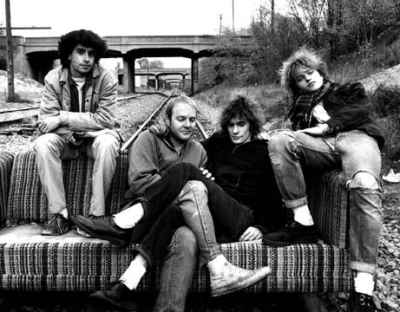“Hold my life, until I’m ready to use it.
Hold my life, because I just might lose it.”
— From “Hold My Life” by the Replacements
No band has propped up my world the way the Replacements did in the ‘80s. Although I’ve had favorite musicians before and since, those performers’ music was just life’s soundtrack, often played low. But I had a gaping hole in my life as a lonely and depressed college student, and the desperate ‘Mats drunkenly stumbled in and filled it. I found joyful independence bellowing along with their frenzied first albums. The sad songs on their later records Let It Be and Tim made me feel less alone.
I discovered the Replacements in the summer of 1984, while I was home in New Jersey, anticipating with dread my sophomore year at Johns Hopkins University. Sorta artsy, sorta strange, I was nineteen blue, lost among the school’s conservative engineering and pre-med types. The rock music of the time provided cold comfort. My favorite bands — Talking Heads, the Police, the Clash and Elvis Costello — had all broken up or lost steam. Then my brother played an album he’d picked up in Saint Paul, Minn., called Sorry Ma, Forgot to Take Out the Trash.
The ‘Mats’ first album, released in 1981, had the energy of hard-core, but was packed with wit and musical hooks. Guitarist-singer Paul Westerberg carried all 18 lightning songs with his impassioned, smoky baritone, while lead axeman Bob Stinson assisted with scorching guitar licks. Westerberg had written all of the songs, displaying wicked irony in songs such as “I Hate Music” and “Shiftless When Idle” more than a decade before it became the universal form of hip communication. While Westerberg’s cleverness was a draw, it was the record’s desperation and musicality that hooked me. In the face of the New Wavers’ fatigue and the hard-core bands’ tuneless rage, Paul belted out the haunting “Johnny’s Gonna Die” like he was the one who was going to die.
By the time I found Sorry Ma, the Replacements already had two other recordings to their credit, the EP Stink (1982) and the full-length Hootenanny (1983). They thrashed even harder on Stink than they had on Sorry Ma, while Hootenanny showed glimpses of pop sensibility with tunes such as “Color Me Impressed.” The band had forged a cult following in the Midwest with their raucous music and drunken live performances, during which they often discarded their own songs and rambled through heavy metal covers. Stinson, the wild heart of the band, wore dresses or shower curtains or nothing at all.
The ‘Mats’ music and attitude inspired me, and I armed myself with Sorry Ma and Stink before I returned to school in the fall. Good thing. At Hopkins, I was losing the poorly chosen companions of my freshman year and the coeds were unimpressed with me. In that sad time, as I considered transferring from Hopkins or from life itself, the Replacements’ music I blasted alone in my apartment was a refuge.
I picked up the band’s third LP, in a presumably ironic nod at the Beatles named Let It Be, the week it came out in 1984. The Replacements were growing beyond their punk roots, employing mandolins, pianos and 12-string guitars, and I was nervous. R.E.M.’s Peter Buck even contributed a guitar solo on “I Will Dare.” Fortunately, the ‘Mats showed they still had fire on “Favorite Thing,” “Unsatisfied” and other cuts. The critics raved over Let It Be and I had to agree with them that it was a magnificent meeting of punk and pop. I still think Let It Be is one of the best rock’n’roll albums ever made.
“I Will Dare” became the Replacements’ first college-radio hit and things began to look up for me as well. I found some of the other artsy weirdoes hiding at Hopkins and started to have the kind of undergraduate hijinks people are supposed to have. Not that I was able to convert my new friends to the ‘Mats way. When I saw the Replacements live for the first time at the 9:30 Club in Washington D.C. in the winter of 1984, I took the train down from Baltimore by myself.
The Replacements were not the wreck of the road I’d heard about. The boys weren’t exactly corporate, sucking down beers on the club floor before the show, but they played a long, spirited set, heavy with numbers from the new album. I got a chance to talk to Stinson before the ‘Mats took the stage, right after he finished signing a fan’s album covers and tossing them onto the floor. “If we ever make it big, I’ll quit,” he declared. It was a spooky statement, given how things turned out, but he had nothing to worry about then. Alternative success was still an oxymoron in the ‘80s. Despite the positive press and college-radio airplay, the Replacements barely filled the 9:30 Club, and the crowd probably numbered less than 500 people.
The record executives saw potential though, and the Replacements moved from the Minneapolis label Twin/Tone to Sire in 1985. They released Tim that year and won more favorable reviews. I snapped up the new record and liked it, though I was finding the band’s rocking numbers less and less convincing. Perhaps I wasn’t one to judge, having mellowed into a more or less happy junior living in a Baltimore rowhouse with liberal arts types.
The Replacements’ trend away from fury continued on Pleased to Meet Me (1987). The band was trying to go straight and Stinson had been kicked out of the band because he drank too much. His impetuous brother Tommy was still the bassist, but the ‘Mats had traded in their piss and vinegar for red red wine. “Can’t Hardly Wait,” a glorious anthem, was emasculated with horns and strings.
I had changed too, taking a relatively high-paying job with the Associated Press in Baltimore after graduating and dating a pretty woman from Goucher College.
That was not the end of the story for the Replacements and me though. In 1989 they made a spirited bid for commercial success, recording Don’t Tell a Soul with Slim Dunlap on lead guitar. I had shifted back to more desperate circumstances, working as a reporter for a small daily newspaper in a depressed logging town in rural Washington, and I picked up the ‘Mats’ latest quickly. It was a good record, better than Pleased to Meet Me had been as far as I was concerned. “I’ll Be You” got significant radio play and the band played small arenas on a national tour. However, they failed to win significant commercial success and they didn’t even try on their last album, All Shook Down (1990).
Westerberg has gone onto a modest solo career, while Tommy Stinson formed a band called Bash and Pop, then later, one called Perfect. Drummer Chris Mars released a couple of lame solo records himself. Tragically but not surprisingly, Bob Stinson died in 1995 after years of drug and alcohol abuse.
The Replacements were one of the best rock bands ever. Not one of their albums sold even 300,000 copies, but the ‘Mats deeply influenced many of the rockers who went platinum when grunge struck a chord with the masses. So much of Nirvana, from its who-gives-a-fuck attitude to its flannel shirts to its desperate, yet poppy garage rock, was done first by the Replacements.
With all their naked emotion and alluring melodies, the ‘Mats inspired a kind of mania among fans. When Paul sang so achingly about being on the outside looking in, he actually cheered up those of us struggling with that view. The Replacements gave me the courage to dance defiantly on the fringe, where I soon found a crowd.
– Claude Iosso
.
.
.
That's where we're riding by mmr421
.



